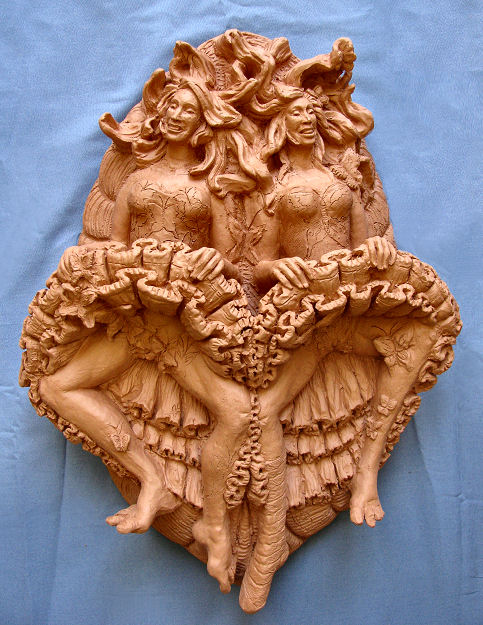-
About the Piece
Clarissa Pinkola Estes
writes with saucy eloquence about Demeter and Baubo in Women Who Run
With the Wolves (p. 362-374). I encourage all of you to read her
chapter in its entirety because her words convey the full breadth of
the Baubo archetype. I will tease you with a short passage:
“There is an aspect of women’s sexuality that in ancient times was
called the sacred obscene, not in the way we use the word obscene
today, but meaning sexually wise in a witty sort of way. There were
once Goddess cults that were in some part devoted to irreverent
female sexuality. The rites were not derogatory, but were concerned
with portraying parts of the unconscious that remain, yet today,
mysterious and largely uncharted. The very idea of sexuality as
sacred, and more specifically, obscenity as an aspect of sacred
sexuality, is vital to the wildish nature. There were Goddesses of
obscenity in the ancient woman’s cultures—so-called for their
innocent yet wily lewdness…the importance of these old Goddesses of
obscenity was demonstrated by their ability to loosen what was too
tight, to lift gloom, to bring the body into a kind o humor that
belongs not to the intellect but to the body itself…The mischief and
humor of the obscene Goddesses can cause a vital form of medicine to
spread throughout the endocrine and neurological systems of the
body.”
Instead of narrating Baubo and Demeter, in a traditional way, I have
expressed their mood and the emotions they stir up in me when I hear
their story. Traditionally, Boubo is rendered with out a head, and
her face superimposed upon her torso, giving voice to the body and
circumnavigating the intellect. In Greek mythology Baubo is the
trickster who shakes Demeter from her deep mourning with sacred
obscene jokes. In addition to a high kicking boisterous dance, the
title cancan refers to a woman’s ability: Yes, We Can!
For questions or comments about Cydra's art, please email: womansculpture@icloud.com |




